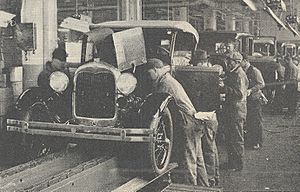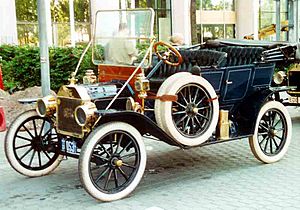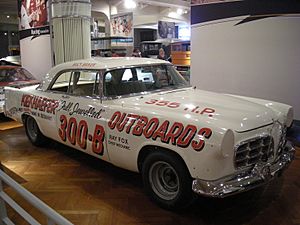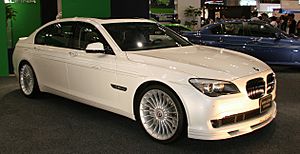Production vehicle facts for kids
A production vehicle or production car is a type of car made in large numbers. These cars are all very similar and and are sold to the public. They must also be allowed to drive on public roads. Different countries have their own rules about what counts as a production car. There isn't one single definition used everywhere.

Contents
What is a Production Car?
The term production car started being used around 1917 in the United States. It was a shorter way to say "mass-produced car." It also meant the car was being made for sale, not just a test model.
Back then, production cars were usually cheaper vehicles. A great example is Henry Ford's Ford Model T. These cars were made in large numbers on special assembly lines. More expensive cars were often built by hand.
Today, the term "production car" includes cars built by hand or on an assembly line. The main idea is that many cars of the same model are made with similar features.
There is no exact rule for how many cars must be made to be called a production vehicle. Also, there are no national laws that define it.
Fastest Production Cars
In 2011, the Guinness World Records listed the Bugatti Veyron as the world's fastest production car. But only five of this special version were made.
Later, some people argued that the Bugatti was a changed version of the car. Guinness looked into it again. They decided that the Bugatti record was still valid. Some reports said Guinness needed at least 50 identical cars to be made for it to be a production car. Other reports said they needed 30 identical cars.
How Production Cars are Defined
In Motorsports
There have been many arguments about what makes a production car different from a modified car in motorsports. Even the Fédération Internationale de l'Automobile (FIA), which sets racing rules, had trouble defining it.
In 1955, new rules were written. These rules defined "production" for certain types of vehicles. They also said a certain number of a model had to be made to qualify. For example, the 1968 FIA rules said that for sports cars, at least 25 identical cars had to be made within a year. These cars also had to be sold to regular buyers.
For Land Speed Records
The FIA also has rules for production cars trying to set land speed records. These rules say that cars must be "series-production automobiles." This means they are already being made when someone tries to set a record.
By Law
Several countries have laws that define production vehicles. For example, in the United States, a car builder named Briggs Cunningham had his business called a hobby by tax officials. This was because he did not make enough of each car model. The tax office saw his cars as special race cars, not production vehicles. Laws often define production cars for safety or tax reasons.
Modified Cars
Some companies, like Alpina, change cars like BMWs. Some governments recognize these companies as car makers. This means their modified cars can be called production vehicles in those countries. Not all companies that modify cars are officially recognized. So, their cars are usually not called production vehicles.
Limited Production Cars
These are cars where only a certain number are made. For example, only 1,500 of the 1957 Rambler Rebel were produced. This makes it a limited production car.
Images for kids
 | Misty Copeland |
 | Raven Wilkinson |
 | Debra Austin |
 | Aesha Ash |






